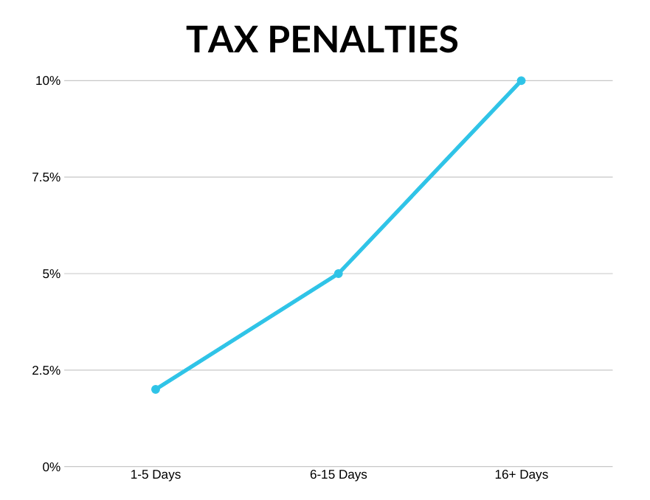
Written by
Ellen Rex
Ellen is an aPHR certified digital marketer on the BerniePortal team who writes about HR technology, resources, and new releases.
Tips for Employer Taxes

*This blog is adapted from the HR Party of One episode, Tips for Employer Taxes, which you can view below.
Tax season is among us - so today, we’re covering what HR Parties of One need to know.
Let’s jump right into it, at a basic level - an employer’s tax responsibilities include:
- Withholding an employees’ contribution for Social Security and Medicare taxes, known as FICA taxes, as well as federal and state income taxes
- Paying employer contributions for FICA taxes
- Paying other employer business taxes
So we’re going to dig into all of these responsibilities in a minute - but first, how did employers wind up responsible for employee withholding in the first place?
The History of Employer Taxes
Income taxes were first implemented in the U.S. through the Revenue Act of 1862 - which also created the Bureau of Internal Revenue, an IRS predecessor. Income taxes were not renewed in 1872, but there was increased support for an income tax in the early 20th Century.
.png?width=650&name=HR%20Party%20of%20One%20Taxes%20Image%202%20(1).png)
The Sixteenth Amendment of 1913 granted Congress the power to collect income tax. Not many people paid income tax at that time, but in 1940, tax obligations increased to fund the war. This is when the Treasury Department implemented employer withholding of income tax, to more efficiently collect these funds.
So that’s income tax, but what about FICA? What does FICA stand for, anyway?
FICA, or the Federal Insurance Contributions Act, was enacted in 1935 as a tax provision of the Social Security Act. Social Security was created by FDR, President Roosevelt, during the Depression. The Social Security Act provided payments to retirees, widows and the disabled, and FICA created the avenue to collect these payments.
In 1965, during President Lyndon Johnson’s administration, Congress enacted Medicare under the Social Security Act to provide health insurance to people age 65 and older, regardless of income or medical history, so those tax obligations increased to include Medicare.
So what are the FICA requirements?
FICA Requirements
FICA requires employers to withhold three separate taxes from the wages you pay your employees. FICA is comprised of the following taxes:
- A 6.2 percent Social Security tax
- A 1.45 percent Medicare tax (the “regular” Medicare tax)
- A 0.9 percent Medicare surtax when the employee earns over $200,000
The law also requires you to pay the employer's portion of two of these taxes:
- A 6.2 percent Social Security tax
- A 1.45 percent Medicare tax
.png?width=650&name=HR%20Party%20of%20One%20Taxes%20Image%204%20(1).png)
Starting in 2020, the maximum earnings subject to Social Security payroll tax increased by $4,800 to a cap of $137,000 - meaning over 11 million workers earning above the previous cap of $132,900 saw more of their earnings taxed.
How much do employers withhold from employee paychecks?
This amount is based on the information they provide on their W-4. This form should be filled out on the employee’s first day, and outlines the tax exemptions they are claiming. There are a few important details for HR Parties of One to know about the W-4.
W-4 Tips
In other words, you can provide information, but not advice. Also, it’s not your responsibility to verify the accuracy of employee information, and employees can change their W-4 at any time.
In addition, the IRS released a new W-4 for 2020. The new form is required for all employees starting work after January 1st, 2020. For more information about the new W-4, check out the blog post here.
Employees who have filled out the W-4 in years prior to 2020 will not be required to submit a new document solely due to the new design.
As an employer, you are responsible for continuing to withhold taxes from paychecks based on previously completed W-4s on file.
Income and Employment Taxes
Outside of the tax withholding responsibilities, businesses must also report income and employment taxes through the Employer’s Quarterly Federal Tax Return, and an annual Federal Unemployment Tax Act to fund the nation’s unemployment insurance system.
Independent Contractors
You do not have to withhold FICA taxes for independent contractors - they pay directly to government agencies, and you do not have to match their payments.
The W-9 form provides independent contractor’s taxpayer identification number, and the 1099 is the form used for their income.
Quickly, here’s the rundown of common tax forms for small businesses:
- Form I-9 (Employment Eligibility Verification) – this must be filled out for every person hired as it verifies the person is eligible to work in the United States.
- Form W-2 (Wage and Tax Statement) – this must be filled out annually for any employee who worked during the preceding tax year.
- Form W-4 (Employee's Withholding Allowance Certificate)– this is completed by the employee and provides the information needed to calculate how much federal income tax should be withheld from each paycheck.
- Form 941 – the federal tax return for employers that is filed quarterly with the IRS.
- Form 940 – this is the Federal Unemployment Tax Act (FUTA) return, which is filed annually with the IRS.
There may also be any applicable state and local required tax forms.
Potential Tax Penalties
Penalties for failing to pay taxes depends on how late the payment is. This is not a comprehensive list of tax penalties, but here are some numbers to know.
- 1-5 Days: 2% penalty
- 6-15 days: 5%
- 16+: 10%

If the IRS sends you a notice stating that you owe federal employment taxes and you pay the deposit directly to the IRS within ten days of the notice, you'll be charged a 10 percent penalty.
If you don't withhold income and FICA taxes as you are required to do, or if you withhold the taxes but don't pay them to the IRS, the IRS is authorized to penalize you up to 100 percent of the taxes you owe.
If you willfully try to evade the federal employment taxes, this is a felony and can be punished by a fine, and you could be imprisoned for up to five years.
If you willfully fail to collect or pay to the IRS any federal employment tax, this is also a felony, and you can be fined and you could go to prison.
Tax Considerations
The kind and amount of taxes you’ll pay will be based on the kind of business you operate - you have the option between an LLC and a Corporation. These differ in formation, ownership, governance and taxes. LLCs have fewer requirements, and can be taxed as C-Corporations or as a “pass-through entity.”
An LLC is owned by one or more individuals while a corporation is owned by shareholders.
Through an LLC, profits of the business are taxed by “passing through” to the owners, with profits and losses reported on individual tax returns, and not at the business level. Filing taxes is often more administratively simple for owners of an LLC.
Corporations are taxed as a separate legal entity, and are responsible for paying tax on their profits and tax on dividends distributed to shareholders.
If you have fewer than 100 shareholders, the next question is if you want to file as an S Corp - which allows a business to be treated more like an LLC with pass through taxes.
Dealing with Taxes in Multiple States
If your business operates in multiple states, you’ll face additional complexity around the varying state and municipal taxes of those areas. This can affect both your business taxes as well as employee tax responsibilities, so be sure to check the withholding requirements in each state in which you operate.
Further, if you are an owner in a ‘pass-through’ entity, you must file individual income tax returns in multiple states. This increases the complexity of filing.
Employee's Personal Taxes
A final consideration is planning ahead for the inevitable employee questions or assistance you might be asked for when it comes to their personal taxes. We’ve experienced employees who moved from one state to another while working for us, leading to some unpaid taxes and filing issues that we had to help them work through.
Homework
There are penalties for failing to pay these taxes on time, so you want to make sure you get it right. If this is something you want to work on at your organization, here’s some homework to get you started improving your employment tax processes:
- Make sure you have a process for storing and retaining employees’ W-4s. The best way is storing W-4s online in an onboarding software like BerniePortal. Not in a folder on your desktop.
- Audit your employer contributions and other business taxes. Like I’ve said before, I am not your tax professional, so you’ll want to make sure you consult one.
- If you don’t have a process for employee tax related questions - make one and document it in your employee handbook. For example, here is the process from the Culture Guide - our employee handbook:
- Proliant (our payroll provider) is responsible for tax deductions. Proliant withholds taxes based off the information you provided in your W-4 during onboarding.
- If you’d like to make changes to your W-4, please contact OS (what we call HR) to unlock your BerniePortal account.
- Proliant has tools available on within your personal account which will allow you to estimate the amount of taxes to be withheld from your paycheck. Please use the IRS Withholding Calculator to determine how much should be deducted from each paycheck.
So take some time to really look at how your company is handling its tax related workflow. Are there bottlenecks in the process? Can the workflow be streamlined or improved upon by going to an all in one HRIS like BerniePortal? Let us know in the comments if you have any tips or tricks for dealing with employer taxes.
Stay up to date on the latest HR topics by subscribing to our HR Youtube series and podcast, HR Party of one below!

Written by
Ellen Rex
Ellen is an aPHR certified digital marketer on the BerniePortal team who writes about HR technology, resources, and new releases.
Related Posts
Yes, you can use a health savings account, or HSA, for cosmetic surgery, but only in...
According to the KPMG 2023 CEO Outlook, 64% of business leaders believe there will be a...
Thomas J. Peters, best known for his book In Search of Excellence, once stated, “The day...
According to the Ethics and Compliance Initiative’s (ECI) 2023 Global Business Ethics...







Submit a Comment